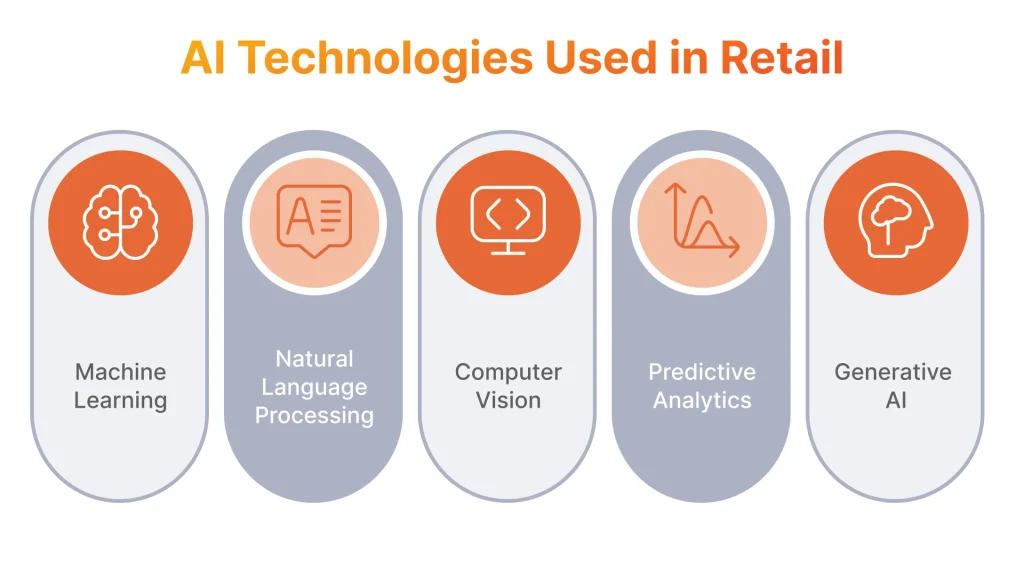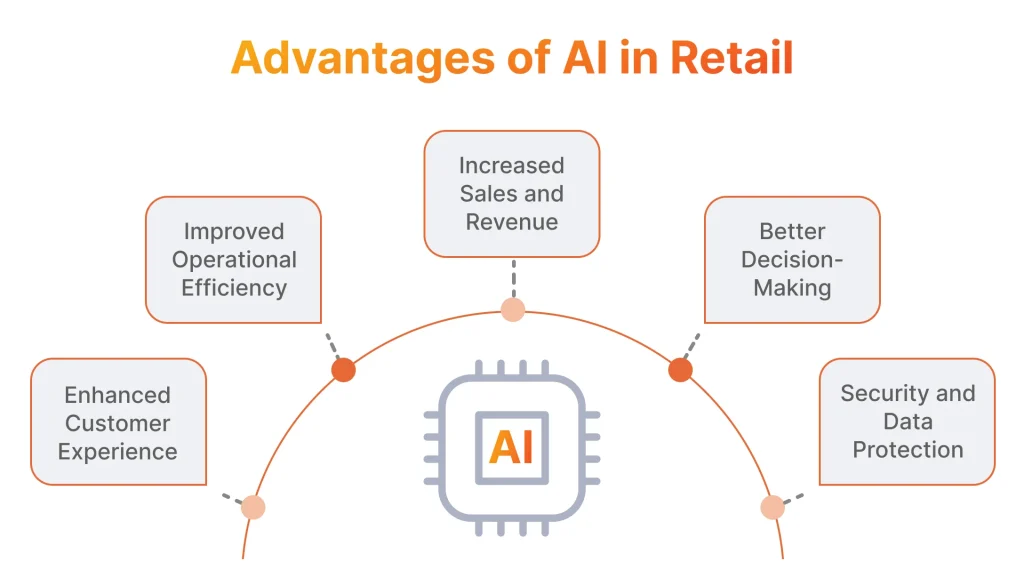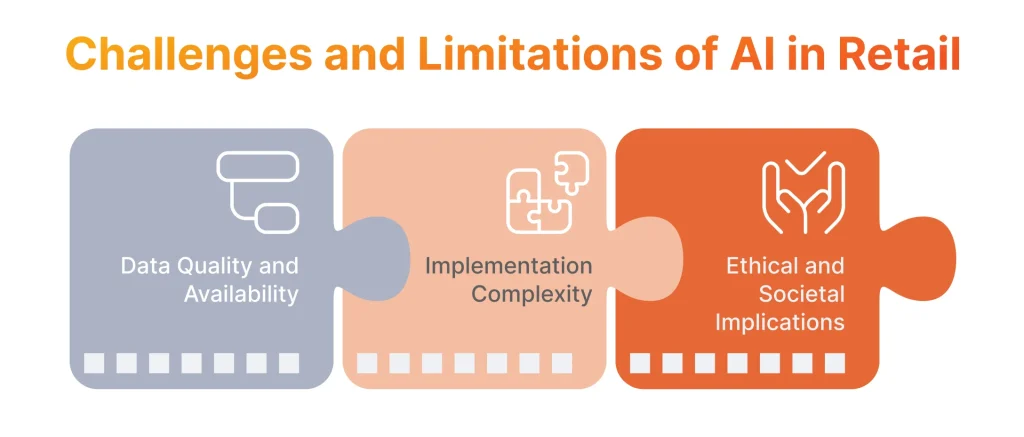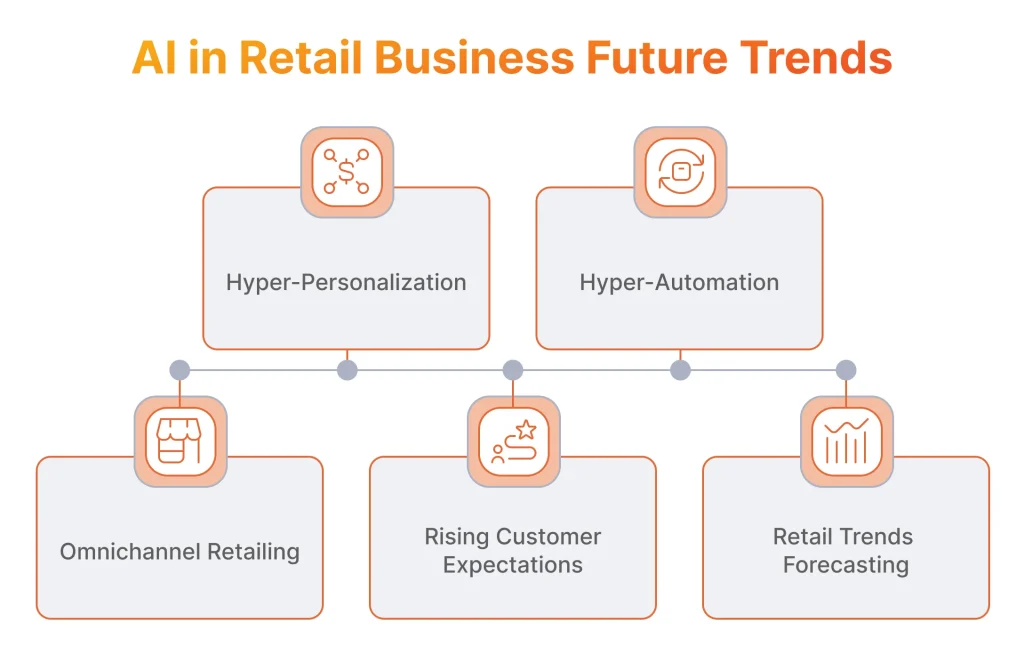In one of our previous articles, we discussed how to build a marketplace, so now let’s turn our attention to how to maximize the potential of your eCommerce platform, or, in fact, any Retail business with Artificial Intelligence.
The global AI in Retail market size is projected to grow from USD 9.36 billion in 2024 to USD 85.07 billion by 2032, at a CAGR of 31.8%, according to Fortune Business Insights. There are a lot of factors that contribute to this impressive growth, and the opportunity to use AI for diverse retail business goals is one of them. That’s why in this article, we decided to discuss the most promising applications of artificial intelligence and machine learning in the retail industry, helping you find the opportunity that matches your current business goals best.
How Artificial Intelligence Works for the Retail Industry
Artificial Intelligence is making a significant impact in a number of industries, and online Retail is leading the trend of wide adoption. Some of the branches of AI are already considered a mainstay in Retail.

- Machine Learning: this is a subset of AI that focuses on developing algorithms and models that enable computers to learn from data and make predictions or decisions without being explicitly programmed.
- Natural Language Processing: this branch of AI deals with the interaction between computers and human languages, particularly to analyze and understand unstructured text data. We already provided a detailed guide on NLP for eCommerce business, so we welcome you to read it.
- Computer Vision: this technology enables computers to interpret and understand visual information from images or videos. In fact, computer vision tools already have 95% accuracy, if G2 is to be believed.
- Predictive Analytics: this one involves using statistical techniques and Machine Learning algorithms to analyze historical sales data and make predictions about future events or trends, as well as demand forecasting.
- Generative AI: allows generating new data, images, text, or other content that is similar to existing data but has novel characteristics. EMARKETER believes that Generative AI has caught on more quickly with the public than either smartphones or tablets did.
The Main Advantages of AI in Retail Businesses
While we’re only tipping the top of the iceberg of value that AI can bring to businesses, more than 80% of retail executives expect their companies will adopt AI automation by 2025, according to research by Analytics Insight. The decision-makers recognize the potential profits, as technology already delivers some major advantages.

Enhanced Customer Experience
AI enables retailers to provide personalized offers and experiences to customers by automatically analyzing their preferences, behavior, and purchasing history. By offering personalized product recommendations, tailored promotions, and round-the-clock support through chatbots and virtual assistants, retailers can enhance customer satisfaction and loyalty. Our high-load support AI chatbot for an online fashion store is a great example of this, showing significant improvements in customer experience.
Among marketing teams that leverage AI tools, 66% already use chatbots to build a stronger connection with customers, according to HubSpot. We have an entire article focused on the benefits of using chatbots and virtual assistants, and we welcome you to read it to obtain more actionable insights.
Advanced Security and Data Protection
One of the biggest retail and eCommerce development challenges is data security. AI technologies can enhance and automate security measures, as well as protect retailers’ data and assets from cyber threats and fraud. By implementing advanced AI-driven fraud detection and data encryption techniques, retailers can safeguard sensitive information, prevent financial losses, and maintain compliance with data privacy regulations.
Are you looking for more information on eCommerce Fraud Detection?
In our recent article, we focused on this particular area, discussing the latest advancements.
Improved Operational Efficiency
AI helps retailers optimize their operations by automating tasks and processes, reducing manual effort, and minimizing errors. Businesses can benefit greatly from the usage of AI for automated inventory management, supply chain optimization, and logistics planning.
We know first-hand how Artificial Intelligence and Machine Learning can boost operational efficiency because we regularly deliver innovative solutions for our clients. In one of the recent cases, we leveraged Artificial Intelligence/Machine Learning for an expanded product range and enhanced eCommerce product listings for a U.S. retailer. We developed a powerful solution for an online retail store providing access to a diverse selection of over 1,000,000 products, and managed to achieve:
- Extended the product range of the client’s inventory, with an efficient scraping of 300,000 products in just 3 hours, enabling the client to significantly expand their product line and cater to a broader customer base.
- Achieved a remarkable increase in loading speed with a Google PageSpeed score improvement from 29 to 97 (web) and from 12 to 90 (mobile), enhancing user experience and search engine rankings.
Increased Sales and Revenue
AI-driven pricing algorithms and recommendation engines can help retailers increase sales by optimizing pricing strategies and identifying cross-selling and upselling opportunities. By dynamically adjusting prices based on market trends and customer demand forecasting, retailers can grow revenue and capitalize on more sales opportunities.
Over 41% of marketers who use Artificial Intelligence/Machine Learning technologies for email marketing campaigns believe that AI improves email marketing revenue, according to research by Statista, which is an essential part of sales for online stores.
Better Decision-Making
With the power of AI analytics tools, retailers gain actionable insights and valuable predictions based on data analysis, enabling them to make informed decisions across multiple vital areas. Real-time analytics dashboards and predictive analytics algorithms empower retailers to monitor performance, anticipate trends, and react quickly to ever-changing market conditions. These factors drive a more informed decision-making process for executives.
Predicting customer behavior with AI unlocks new opportunities and possible revenue streams for retailers.
Find out how to do it right in our article!
Considerations for Implementing AI in Retail
Before thinking about major investments, Retail companies should conduct internal research and determine whether the following factors would not be a blocker to the implementation of an Artificial Intelligence or Machine Learning systems.
Integration with Existing Systems
Chances are your existing infrastructure was not designed with AI integration in mind, so here are a few suggestions to consider:
- Before getting started with AI implementation, conduct a thorough assessment of your existing systems, including POS systems, inventory management systems that monitor product availability, CRM systems, supply chain systems, and eCommerce platforms. Identify integration points, data dependencies, and potential bottlenecks that may impact the implementation of AI solutions.
- Ensure that the AI solutions you choose, if you want to use ready-made ones, are compatible with your existing systems and can integrate with them. Look for solutions that offer robust APIs, connectors, or plugins that facilitate integration and interoperability across different systems and data sources.
- Establish data integration pipelines and data governance practices to ensure the consistency, accuracy, and reliability of data used for AI modeling.
Cost and ROI Analysis
Conduct a comprehensive analysis of the Total Cost of Ownership (TCO) associated with implementing your solution. Consider factors such as:
- Upfront costs like software licensing fees or hardware infrastructure.
- Ongoing operational costs, for example, maintenance, support, and training.
- Potential hidden costs like data acquisition, integration, and compliance.
Evaluate the potential Return on Investment (ROI) of AI initiatives as well, by assessing the expected benefits and outcomes relative to the costs incurred. Set clear performance indicators and benchmarks to measure the success and effectiveness of AI implementations over time.
Training and Talent Acquisition
Assess your organization’s internal HR capabilities and identify any skills gaps or training needs related to AI implementation. Determine whether you have the necessary talent and expertise in-house, or if you need to acquire additional skills or resources to support AI initiatives, for example, you may need narrow expertise for Machine Learning models for Fraud Detection.
In case you need more talent, develop recruitment strategies to attract top experts and build diverse, multidisciplinary teams that can collaborate effectively on AI projects. SPD Technology can help you with this task, and build a dedicated team of AI engineers highly experienced with building advanced solutions for retail and eCommerce.
Challenges and Limitations of AI in Retail
There are still some aspects that need to be addressed, however, hopefully, they will all be solved soon to maximize the potential of AI technologies for Retail business.

Data Quality and Availability
When we talk about the quality of available data, we refer to the accuracy, completeness, consistency, reliability, and relevance of data for a specific use case or application. Having high-quality and readily available data is essential for the effective and accurate performance of AI tools.
The main issues with data for the organization may include:
- Fragmented Data Sources: retailers collect data from various sources such as Point-Of-Sale (POS) systems, eCommerce platforms, Customer Relationship Management (CRM) systems, social media, and brick-and-mortar stores. These data sources may be siloed or fragmented, making it difficult to integrate AI, analyze, and use data effectively.
- Legacy Systems: the business may have an outdated system that stores data in different formats and structures, hindering data integration and interoperability. Legacy systems will probably lack the capabilities to capture and process real-time data, limiting the availability of information for AI algorithms.
- Data Privacy Regulations: Retail industry as a whole is subject to stringent data privacy regulations such as GDPR and CCPA, which impose restrictions on the collection, storage, and processing of customer data. Compliance with these regulations requires retailers to implement robust data governance practices and ensure data privacy while still leveraging data for AI applications.
- Data Bias and Inaccuracy: retail data may contain biases or inaccuracies, resulting from factors such as sampling bias, data entry errors, or outdated information.

Serhii Leleko
ML & AI Engineer at SPD Technology
“Setting up a proper data collection process is critical for applying AI in your business. You should always start by clearly defining what business goals you want to achieve, and only after that start identifying the relevant data sources you might have. Make sure you don’t collect the data that you don’t actually need, to make the job easier for AI engineers, and don’t waste time on collecting and sorting irrelevant data.”
Implementation Complexity
Many retailers operate across multiple channels like eCommerce platforms, brick-and-mortar stores, and mobile apps, and have different functions including sales, marketing, and supply chain, for example. Each of those channels and functions has its systems, processes, and stakeholders. Depending on the structure of the business and its size, integrating AI solutions across diverse systems and processes can be challenging and require additional collaboration and coordination across different departments and teams.
Ethical and Societal Implications
The adoption of AI in Retail comes with several ethical and societal implications that need to be carefully considered.
Algorithmic Bias
Systematic errors or prejudices in AI algorithms result in unfair or discriminatory outcomes, often reflecting biases present in the training data or design choices made by developers. Some of the most common ones include bias in product recommendations, product placements, pricing disparities, or discriminatory hiring practices. Biased AI algorithms can lead to unequal treatment of customers or employees based on factors such as race, gender, age, or socioeconomic status.
Privacy Concerns
Since online retailers collect vast amounts of customer data, including personal information such as purchase history, preferences, and demographic details, AI applications that leverage this data may raise concerns about data privacy, surveillance, and data security. When AI solutions collect, analyze, or process personal data without adequate consent or safeguards, it may potentially infringe on individuals’ privacy rights. So, if customers perceive a lack of transparency or control over how their data is used, it may lead to trust issues and potential reputational damage for businesses.
Job Displacement
Since AI technologies automate tasks and processes traditionally performed by human workers, it may lead to a reduction in the demand for certain types of jobs or skills. For retail, specifically, AI-driven automation can lead to job displacement for roles that involve repetitive or routine tasks, such as cashiering, inventory management, or customer service. Before implementing AI solutions, businesses must consider the societal impacts of job displacement and develop business strategies to upskill affected employees to adapt to changing job requirements or transition to new roles.
AI in Retail Future Trends and Opportunities
The future of AI in retail is looking to be very bright, as the new emerging trends are on the way to get center stage and become the talk of the industry.

Hyper-Personalization and Hyper-Automation
Hyper-personalization uses advanced data analytics and AI techniques to tailor products, services, and marketing efforts to the specific needs, preferences, and behaviors of customers. It goes beyond traditional personalization by leveraging real-time data and contextual information to deliver highly relevant and timely experiences to each customer. The expectations for hyper-personalization are already massively high, as McKinsey research shows that 71% of consumers are already expecting companies to deliver personalized interactions.
Speaking within the context of this trend, the business impact of Big Data and AI is quite significant, enabling gathering and analyzing vast amounts of data to deliver highly personalized shopping experiences and ultimately leading to higher customer retention.
Retail giant Amazon is already heavily using this opportunity, creating a personalized homepage for each customer based on such factors as historical shopping habits, wish lists, and shopping carts. Anticipating the needs of its customers makes it easier to find what they’re looking for and discover new products.
Serhii Leleko
Serhii Leleko, ML & AI Engineer at SPD Technology
“In the future, we can expect even more sophisticated personalization techniques, where AI algorithms deeply consider contextual factors such as location, weather, and current trends. This level of hyper-personalization will help retailers anticipate customer needs and preferences more accurately, leading to entirely new levels of customer satisfaction and loyalty.”
Hyper-automation, on the other hand, involves the usage of AI, ML, robotics, and process automation to optimize a wide range of business processes across an organization. It aims to streamline workflows, improve efficiency, and reduce human intervention by automating repetitive tasks and decision-making processes.
Amazon uses hyper-automation in its warehouses as well. In particular, they use advanced robotics and AI to automate various tasks such as sorting, packing, and shipping, improving efficiency and leading to lowered operational costs, as well as successful loss prevention efforts.
Rise of Omnichannel Retailing
Seamless integration of various online and offline channels, including brick-and-mortar stores, eCommerce websites, mobile apps, and social media platforms to provide customers with a unified and consistent shopping experience will only evolve. Today, it is not enough just to build an eCommerce website and have a few physical stores across the country, but rather deliver a cohesive brand experience across all channels and touchpoints.
So, the current top omnichannel retailing trends include:
- Unified Commerce Platforms: integrating all channels and touchpoints, providing customers with a seamless shopping experience across online and offline channels.
- Click-and-Collect Services: offering curbside pickup, locker pickup, and in-store pickup options, providing online shoppers with convenience and flexibility in how they receive their orders.
- Social Commerce: turning social media platforms into shopping destinations, with retailers leveraging social commerce features to sell products directly to consumers.
Evolution of Customer Expectations
With this rapid technology rise, it’s safe to say that even more new trends will emerge, and more customers will expect that retailers will anticipate their needs, provide personalized customer experiences, offer convenience, and demonstrate transparency and authenticity in their interactions. Businesses need to keep a finger on the pulse of how Artificial Intelligence transforms customer service and be ready for drastic changes, when necessary.
This is a critical area for the industry and major companies are constantly working on improving customer interactions, as the customer experience management market size was valued at USD 12.04 billion in 2023 and is expected to grow at a compound annual growth rate (CAGR) of 15.4% from 2023 to 2030, according to a forecast by the Grand View Research.
AI-Driven Shopping Trends Forecasting
This involves the use of AI and advanced data analytics techniques to analyze large volumes of data from various sources, including social media, search trends, historical sales data, and external factors, to identify emerging trends and predict future consumer behavior. This can be a very valuable feature to add during eCommerce app development. By leveraging AI algorithms, retailers can gain valuable insights into changing market dynamics, customer preferences, and customer demand patterns, enabling them to make data-driven decisions and capitalize on emerging opportunities in the market.
AI-driven Shopping Trends Forecasting is a very similar concept to demand forecasting with ML in Retail, which we discussed in great detail in one of our previous articles. In both cases, AI-powered analytics are enabling retailers to forecast trends and predict customer behavior more accurately than ever before.
Conclusion
The broader implementation of Artificial Intelligence in the Retail sector is already transforming the industry and will make a more significant impact in the near future. Use cases like personalized recommendations, dynamic pricing decisions, virtual try-on experiences, generative content creation, and predictive analytics and Machine Learning in retail are already reshaping key aspects of the industry.
We, at SPD Technology, are ready to help you get the most out of AI software, developing customized solutions to understand your customers better, optimize inventory management and supply chain, as well as streamline operations and processes, like we did in our case with leveraging AI/ML for expanded product range and enhanced eCommerce product listings. We have the experience to deliver tailored products to meet evolving demands of retail businesses and the highest expectations of your customers.
FAQ
How is AI Used in Retail?
AI is revolutionizing the Retail industry by offering solutions that enhance customer experience, reacting to customer feedback and customer intent, optimize operations, and drive sales. Some of the most important applications of AI in retail include:
- Personalized Recommendations
- Automated Inventory Management
- Demand Forecasting
- Customer Service Chatbots
- Dynamic Pricing
- Visual Search Powered by Computer Vision.
How Is Generative AI Being Used in Retail?
Generative AI, a subset of Artificial Intelligence, can be very convenient for tasks like:
- The generation of content including product descriptions, marketing copy, and social media posts.
- Leveraging generative AI and Augmented Reality for the Virtual Try-On includes realistic virtual models or avatars that customers can use to try on clothing and accessories, thanks to motion analytics, computer vision, and object detection technologies.
- The offering of AI-generated, customized, products based on customer preferences and specifications.
Why is Generative AI Better Than Standard Bots for CX in the Retail Industry?
Generative AI offers several major advantages over standard bots for improving customer experience:
- Creating more personalized and creative content.
- Simulating human-like interactions more effectively.
- Offering realistic visual representations of product attributes.
- Allowing retailers to differentiate themselves by customers offering unique experiences and products that stand out in the market.

